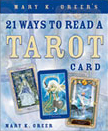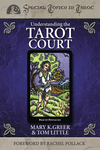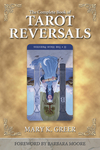Tricks for the Tarot Trade

Far too many people worry about reading tarot cards the "right" way. I find instead that there are more helpful and less helpful reading techniques, depending on the situation. It is also believed that when reading for others we must do what the client expects. This all too often means to predict the future and tell people how to obtain their desires. Is the job of a foot doctor to cure lung cancer? I feel that as readers we have a right, even an obligation, to discover what we do best and to offer that in readings both for ourselves and for others. The task becomes learning what we do best and offering that with clarity and confidence.
In Mary K. Greer's 21 Ways to Read a Tarot Card I decided to lay out the contents of my "bag of tricks" for everyone to see, try and choose among for themselves. I'm proud of these techniques, as I've learned them over several decades of teaching and taking classes, reading and trial-and-error practice. They are the beloved tools of my trade, gathered as time and life have brought me new challenges and ways to meet them. Not everyone needs to be the most versatile reader possible. Many have focused on doing one thing well. My greatest gift that I can share with you has always been exploring a variety of perspectives and synthesizing what I've found. I search for where different approaches connect and diverge so as to go deeper than I can with any one of them.
For over thirty years I've used, refined, and taught these tarot interpretation techniques, and am confident that each will, in its own way, benefit the person who gives them a fair trial. Mary K. Greer's 21 Ways to Read a Tarot Card offers flexibility. By experimenting with all the techniques, a person can eventually mix-and-match to produce his or her own preferred set, resulting in an unique approach to reading tarot that best serves that reader's skills, strengths, purpose, and world-view. Furthermore, working through this book makes sure that tucked into the corners of that bag of tricks are additional options that can be pulled out, dusted off and applied when others just aren't doing the job.
I've written most of my books because I felt there was a need to clarify areas of confusion and to explore new possibilities and techniques. My first book, Tarot for Your Self came into being because all the books prior to that time said never read tarot for yourself, yet almost everyone I knew secretly did. These books also advised memorizing card meanings before trying a spread, which I found difficult and unbearably boring. My "failures" led to searching out alternate approaches. If reading for yourself doesn't work according to traditional understandings of what a reading does, then, I asked, what does it do? And, how could that be its strength? I experimented with breaking every tarot "rule" I could find. My own rule became: use something only if it makes sense, it's enjoyable or it works. As a result, I've integrated several tarot traditions into my own practice—but never unquestioningly.
In Mary K. Greer's 21 Ways to Read a Tarot Card, I include meanings for suits, elements, numbers, and symbols, but the emphasis is on teaching principles and techniques that draw on each person's knowledge, life experience, and inner wisdom. As much as integrating new information, I want both readers and querents to learn to listen to themselves. This book concentrates on ways to access the wise self that lies within each of us. Each person accesses their inner wisdom in different ways. For some it's visual; others are auditory or tactile. One person may find meaning in system-based patterns emerging from number and suit symbology; another responds most strongly to shape and color. For others, the cards speak directly. Relevant information can even lie in the muscle tension necessary to juggle two pentacles, wield a sword, or reach for a cup. There are so many ways to find the message in a tarot card and some of the more unusual methods are most revealing precisely because they bypass previously-established assumptions and resistances.
Moving beyond surface meanings, no matter how "correct" they are, gives access to deep, soul-stirring insights. I've tried in this book to convey the power of what I've come to call a reading that is interactive, transformational, and empowering (R.I.T.E.). The task in a reading, as I see it, is to discover how to meet whatever happens in the best possible way—to help you grow, develop your potential, and work out difficulties in your life. The twenty-one ways in this book will help you do that.

About Mary K. Greer
Related Products



is subject to certain Terms and Conditions